Archive for July, 2012

TCI faces VAT next year as bill signed by UK boss
(CNS): VAT has now become law in the Turks and Caicos Islands after the bill was signed by the Acting Governor Patrick Boyle, on Thursday. Officials from the UK’s interim governmentsaid no one on TCI’s Consultative Forum voted against it with five members voting in favour and five abstaining. AS a result people on TCI will be paying the new tax from April next year. 2013. There will be no sales tax on fruit and vegetables, fresh meats, hurricane supplies, leases, rents, water and electricity or cooking fuel and building materials in order to support the local construction industry, the government said.
Although there was a concerted campaign by the business community to persuade government to take a different course the community now has just eight months to prepare itself to pay the new tax.
“I hope that everyone who took part in this debate can put their differences of opinion behind them to help make the implementation of VAT as successful as possible,” said Boyle in a statement on Thursday. “VAT implementation here is about providing our essential public services with a more predictable, regular and stable cash flow. If we can harness the energy and creativity of TCI’s businesses, I am sure that we can be successful together.
“The Forum made clear that they would like to see more examples of how VAT will affect the man or woman in the street and smaller businesses, as part of a wider education programme. We accept too that the VAT debate so far ended up being above their heads between Government and TCI's bigger businesses. We are working on this now.”
He said regulations were still being finalised but would be released over the next eight weeks along with the zero-rated and exempted items.
The VAT White Paper is available here
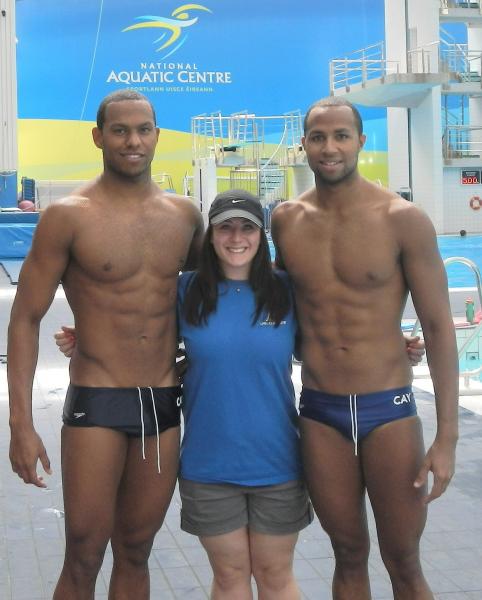
Cayman swimming stars warm up for big games
 (CNS): Both Shaune Fraser and Brett Fraser competed in Florida Summer Sectionals at the Hall of Fame pool In Ft. Lauderdale, Florida recently as a warm up to their departure for Ireland and pre-Olympic games training. The meet went very well for both of the swimmers with Shaune winning the 200m freestyle in a time of 1:52.30 and his younger brother Brett finishing close behind in a time of 1:52.49. Theboys are now in Dublin and have already started their training alongside some of their Florida Gator teammates who will also compete in London for their respective countries.
(CNS): Both Shaune Fraser and Brett Fraser competed in Florida Summer Sectionals at the Hall of Fame pool In Ft. Lauderdale, Florida recently as a warm up to their departure for Ireland and pre-Olympic games training. The meet went very well for both of the swimmers with Shaune winning the 200m freestyle in a time of 1:52.30 and his younger brother Brett finishing close behind in a time of 1:52.49. Theboys are now in Dublin and have already started their training alongside some of their Florida Gator teammates who will also compete in London for their respective countries.
“It's starting to settle in that the games are fast approaching and I am starting to feel more and more prepared each day,” said Brett who along with Shaune will head for the London 2012 Olympic Village on the 25 July.
While in Ireland, the swimmers will be resting and acclimatizing to the similar conditions that they will be subject to in London. The weather has been cool and rainy with the sun coming out on occasion, which they say is a nice change from the heat.
Ashley Stern, the physiotherapist for the Cayman Islands team for the first half of the Games, also accompanies them.

Police issue warning over e-mail robbery con
 (CNS) Officers from the Financial Crimes Unit at the RCIPS are issuing another warning about the latest email scam that is circulating in Cayman. Not uncommon, in this online con the scammers pose as holidaymakers who claim to have been left penniless after being robbed at gunpoint. The fraudsters claim that they and their family have had cash and credit cards stolen and need help to pay their hotel bill. Detective Inspector Ian Lavine of the FCU said the public should never give out their bank details via e-mail. "If anyone receives this e-mail they must not respond," he said. "Do not reply but report it immediately to police."
(CNS) Officers from the Financial Crimes Unit at the RCIPS are issuing another warning about the latest email scam that is circulating in Cayman. Not uncommon, in this online con the scammers pose as holidaymakers who claim to have been left penniless after being robbed at gunpoint. The fraudsters claim that they and their family have had cash and credit cards stolen and need help to pay their hotel bill. Detective Inspector Ian Lavine of the FCU said the public should never give out their bank details via e-mail. "If anyone receives this e-mail they must not respond," he said. "Do not reply but report it immediately to police."
Anyone who wishes to speak to an officer in the Financial Crime Unit should call 949-8797
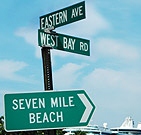
Bush proposes 9 districts
 (CNS): Despite the majority result in Wednesday’s referendum in favour of one man, one vote and single member constituencies, the premier has proposed an entirely different voting system and has announced his intention to set up a committee to examine the idea of creating eight districts on Grand Cayman, each returning two members, and retaining the status quo on Cayman Brac. Speaking on Radio Cayman on Thursday evening, McKeeva Bush announced his intention to create a bipartisan committee to examine this or other options. Such a proposal would, however, require the boundaries on Grand Cayman to be entirely redrawn.
(CNS): Despite the majority result in Wednesday’s referendum in favour of one man, one vote and single member constituencies, the premier has proposed an entirely different voting system and has announced his intention to set up a committee to examine the idea of creating eight districts on Grand Cayman, each returning two members, and retaining the status quo on Cayman Brac. Speaking on Radio Cayman on Thursday evening, McKeeva Bush announced his intention to create a bipartisan committee to examine this or other options. Such a proposal would, however, require the boundaries on Grand Cayman to be entirely redrawn.
In his unpublicised broadcast on the government radio station Bush said this proposal for returning 18 members to the legislative Assembly at the next election would address local perceptions about inequality but would not have what he believed were the “dangerous elements” of single member constituencies.
Although the referendum result delivered a clear and irrefutable message to the government about what the people want, with only ten months before the next general election the premier is proposing to completely change the boundaries established by the constitutionally formed boundaries commission.
Bush described the creation of eight double-member constituencies on Grand Cayman with as equal a number as possible of registered electors, who would have one vote each, where the top two candidates would be returned to the country's parliament.
Echoing comments made by Rolston Anglin shortly before the referendum, Bush said that there needed to be more discussion on improving the electoral system, as he announced the creation of a new group to examine the way Cayman votes.
Despite considering the referendum result a binding 'No' Bush said he was a leader that looked at all the angles of how people feel.
While I don’t believe that single member constituencies are good for the country, I want to continue to work for equality and a system that is fair," he said.
"I would propose we continue the discussions as to whether our present system should be examined without being skewed by the prism of so much politicization and whether we should consider moving toward a new system of all multimember constituencies, with eight electoral districts for Grand Cayman of roughly the same number of voters each and each electoral district returning two MLAs."
He said that Cayman Brac and Little Cayman would be left as is but the change on Gradn cayman would be in line with the principles of “equality and fairness as advocated by the One Man One Vote Committee."
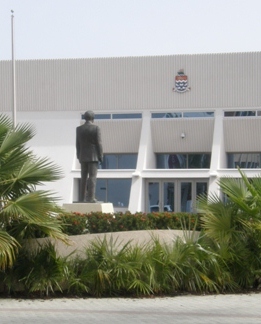
MLAs should not ignore vote
 (CNS): The committee members of the one man, one vote campaign (OMOV) have warned all elected officials not to ignore the result of the national referendum on Wednesday as the people have put them all on notice. The majority ‘yes’ vote did not carry because of the government’s decision to require 50% plus 1 of the entire electorate and not a majority of the turnout, so the result will not change the voting system, the OMOV members said, but maintained that voters do want change. Al Suckoo told CNS that the result was a very clear victory because “in order to participate in democracy, voters have to turn up” and those that did clearly wanted change.
(CNS): The committee members of the one man, one vote campaign (OMOV) have warned all elected officials not to ignore the result of the national referendum on Wednesday as the people have put them all on notice. The majority ‘yes’ vote did not carry because of the government’s decision to require 50% plus 1 of the entire electorate and not a majority of the turnout, so the result will not change the voting system, the OMOV members said, but maintained that voters do want change. Al Suckoo told CNS that the result was a very clear victory because “in order to participate in democracy, voters have to turn up” and those that did clearly wanted change.
Speaking in the wake of the result that delivered a 2-1 majority in favour of single member constituencies, Johan Moxam and Al Suckoo, both members of the OMOV Committee, pointed to the message that the voters had delivered. Regardless of the artificial requirements placed on the result, it is a warning to everyone in office that the people are not satisfied with the “same old, same old”, the men said.
Claiming the moral victory, the grassroots campaign, which was run on a shoestring budget in stark contrast to the massive UDP government machinery and $100,000 ‘no’ campaign, proved that hard work and commitment to a genuine cause can pay off, Suckoo said, given the result, which showed the OMOV had won the overwhelming majority of the popular vote. Although the campaign had received PPM support, he pointed out that it was an independent movement.
Grateful to all those who came out to the polls as well as the hardworking volunteers on the elections team, Moxam and Suckoo said they were both proud of what had been accomplished by the OMOV group of concerned citizens.
Suckoo said he had no doubt at all that had the OMOV campaign been able to carry on educating the public until November, as intended by the non-partisan grassroots movement that circulated the petition, the result would easily have reached the high bar of 50% of the electorate required for a people-initiated referendum.
However, this vote was a government sponsored ballot, which should have carried with a simple majority. Nevertheless, both Suckoo and Moxam said the result still carried a clear message that local politics could not return to business as usual.
“No elected official can ignore the wishes of the voting public,” Moxam stated. “Cayman is ready to move away from the current style of politics and rhetoric.” The campaign had in the end, he said, been taken over by party politics, which was exactly what the people did not want and why many of them refrained from voting.
Suckoo agreed that the campaign had become very personal in part, with attacks being made, especially by the premier on supporters of the movement.
During the UDP rallies against the OMOV position, Bush spent a considerable amount of time attacking and criticising the individual players and personalities rather than explaining his opposition to the system that they were promoting.
“We need to raise our expectations of our political representatives,” Moxam said. “We need leaders who comprehend the important issues, who are competent, respectful and prepared to act in the best interest of the voting public and the Cayman Islands.”
Moxam said it was inaccurate for the premier to assume that those who did not vote were voting 'no' to the referendum question, and said the quality of the current representation was the real problem. “I believe there was voter apathy, with voters being tired of the immaturity and vitriol in the current political rhetoric, but those that did go to the polls showed they were tired of the same old, same old and are demanding a better standard of representation.”
He spoke of the need for politicians with vision who wanted to engage in proper discussion and debate on the key issues of the day and find collective solutions for the problems facing the Cayman Islands.
“The numbers should shake up the government to take stock,” Moxam added as he pointed to the 5,631 votes in favour of SMCs.
Vote hijacked says Mac
(CNS): Political bosses who are desperate for power hi-jacked the national referendum on single member constituencies, the premier said in the early hours of Thursday morning when he delivered a speech to his UDP supporters in George Town after the result. McKeeva Bush said he wanted to acknowledge what he said were the “well intentioned young Caymanians” that had started the OMOV movement based on their beliefs but he said it was “hi-jacked by the political bosses”. Bush himself was accused of hi-jacking the campaign started by those same grassroots activists when he decided to set the referendum on government’s and not the people’s terms. (Photo courtesy of Cayman27)
During his speech after the polls closed, when a majority ofvoters had polled in favour of single member constituencies, Bush made it clear he believed the result was still a ‘no’ because of those who did not vote. He accused the opposition party and the independent member for North Side of taking over what had started as a discussion about the country’s electoral system.
“It was unfortunate that it was hi-jacked by political bosses so desperate to grasp power they would trample on anybody to get a platform,” Bush told the UDP crowd. “Unfortunately what seemed to start off as a discussion about the political system and a choice between multi-member and single-member constituencies quickly turned into a tidal wave of PPM and political rants.”
He said the people saw through this as they didn’t want the electoral boundaries redefined only to make it easier for the opposition to get elected.
Bush admitted that the campaign was heated, as he said there was too much politics put into it by those political bosses and opposition members because they brought the Dart issue, the weakness of economy and “used everything against government and every weapon they had” during the OMOV campaign.
Defying logic, the premier stated that the results of the referendum spoke for themselves, and despite the fact that voters polled two to one in favour of single member constituencies, because some voters did not vote he said that they had spoken. He claimed the results reflected the wishes of the people but he said the elections office was wrong about the poll being advisory and maintained that it was a binding referendum.
Bush also said that the people who did go out and vote ‘yes” were all PPM people. The people in his own constituency of West Bay, on the other hand, were upset about the referendum and he stated that “hundreds of them” had told him that government should not have spent money on the vote and they “felt as the constitution said what it said they could stay away and still register the vote, so they stayed away,” he said.
The PPM people came out in force “because they had to or else,” Bush told the crowd, but his people stayed home and the UDP had not been running around getting people to come out. He said all the government had done was have a few meetings.
The good thing about the result was that the majority of voters said 'no' by staying away or by coming to the polls to vote ‘no', Bush claimed, and according to the constitution that meant there was a ‘no’ majority. Quoting the constitution, he referred to the sections dealing with a people-initiated referendum and not a government sponsored poll, which is dealt with under a different section. (See viewpoint Not all referenda are equal.) This was a government ballot as the petition for the people-initiated referendum asking for a November poll was never submitted.
Bush pointed to the difficulties his government now had to focus on, including his failure as minister of finance to produce a budget and the challenging economic climate. “We have our work cut out for us,” he said, as he urged people to join government to help solve its problems and work to turn the economy around and create jobs.
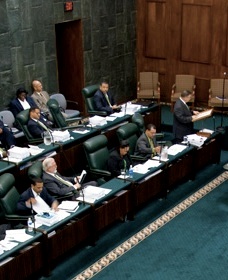
Over 80% reject status quo
 (CNS): Although the Cayman Islands premier believes that the people who stayed away from the polls yesterday were rejecting single member constituencies, their failure to vote can also be seen as a rejection of the current voting system. 19.7% of the registered voters cast their ballot against the idea of one man, one vote in single member constituencies, favouring the current voting system. However, in contrast over 37.1% specifically voted in favour of that system and close to 43% chose not to vote either for or against that system. Although 80% of voters did not actively support the status quo or were very clearly supporting OMOV, McKeeva Bush has stated that as far as he is concerned the referendum was binding in favour of the current system and not, as the election’s office has said, advisory.
(CNS): Although the Cayman Islands premier believes that the people who stayed away from the polls yesterday were rejecting single member constituencies, their failure to vote can also be seen as a rejection of the current voting system. 19.7% of the registered voters cast their ballot against the idea of one man, one vote in single member constituencies, favouring the current voting system. However, in contrast over 37.1% specifically voted in favour of that system and close to 43% chose not to vote either for or against that system. Although 80% of voters did not actively support the status quo or were very clearly supporting OMOV, McKeeva Bush has stated that as far as he is concerned the referendum was binding in favour of the current system and not, as the election’s office has said, advisory.
In a speech to his supporters in the early hours of Thursday morning following the referendum, which was carried almost two to one in favour of single member constituencies by those that voted, the premier described the result as a win for multi-member constituencies. Even though the vote was more than 2-1 in favour, it did not attain the artificially high standard designed only for people-initiated referendum of 50% plus 1 of registered voters and Bush is not taking the result on advice.
“The majority of registered voters placed a ‘no’ and voted by staying away or coming to the polls and voting ‘no’ to single member constituencies. Nobody can make it any other how that’s what happened,” he said. “The people of the Cayman Islands have spoken and so we must all listen. They have said clearly that this country has other more urgent national issues than single member constituencies.”
However, according to the poll the result was a clear majority for ‘yes’ to the question calling for change, as 61.5% of voters polled voted in favour of the referendum. And although the turnout was lower than Cayman has come to expect in general elections, for a mid-term standalone referendum during the summer break, the number of voters in comparison to other national polls was not insignificant. A majority of registered electors, more than 57%, did take the time to go to the polls and vote for the referendum question.
Following the final result, Ezzard Miller, the independent member for North Side who spearheaded the campaign, said the premier could not claim victory. With 80% of the electorate making it quite evident that they did not support the status quo and the current political system, Bush could not take that as a win for the multi-member system, he said.
“There is no question that 80% of the electorate is not satisfied with the status quo,” he said adding that the premier was wrong to assume the people who didn’t go to the polls would have voted ‘no.’
“The trend was a very clear 2-1 in the major constituencies of George Town and Bodden Town and it would have likely continued in that vein regardless of the numbers. Even in his stronghold of West Bay, in the wake of him spending $100,000 of the people’s money on the ‘no’ campaign, the people in that district only voted against the referendum with the slimmest margin,” Miller pointed out.
No matter how Bush attempted to spin the result, the independent member said the country’s leader had to face the fact that the voting public were overwhelmingly in favour of single member constituencies.
“We crossed the normal hurdle,” Miller stated. “Under any other circumstances with a majority of registered voters going to the polls and a majority of that vote in favour, the referendum would have carried. The problem is that it did not attain the artificial hurdle set by the UDP government.”
Miller said the poll was an emphatic vote for change. “The people want change and they are clearly not satisfied with the level of representation they are getting and that was an important message delivered by those whovoted.”
Although Bush has not yet confirmed how government will accommodate three new seats in the Legislative Assembly at the next election, as provided for in the constitution, earlier indications from the premier were that he would add two seats to the capital and one in Bodden Town. However, as the OMOV campaign gathered momentum, even Bush began to acknowledge that having voters in George Town casting six votes was unfair and that he wanted to place one of those seats in West Bay, even though the population does not support such a move.
The premier will in the coming months, however, have to decide how those new seats will be accommodated based on population and traditional district areas. He has rejected the Electoral Boundary Commission’s recommendation of a new seventh electoral district between George Town and Bodden Town, covering the communities of Spotts, Newlands and Savannah, leaving him with only one option that does not involve gerrymandering. This means registered voters living in George Town will be given significantly more influence on the election of the next government than any other district.
Final results of the national referendum on single member constituencies and one man, one vote are as follows:
National vote: 'yes' = 5631 (37.1% of registered voters), 'no' = 3,001 (19.7% of registered voters). 61.5% of those who voted, voted in favour of the quesiton.
CBLC: yes – 256, no – 203
East End: yes – 257, no – 79
North Side: yes – 335, no – 56
West Bay: yes – 1027, no – 1053
Bodden Town: yes – 1396, no – 617
George Town: yes – 2360, no – 993
Turn out was 8715 or 57.67% of registered voters
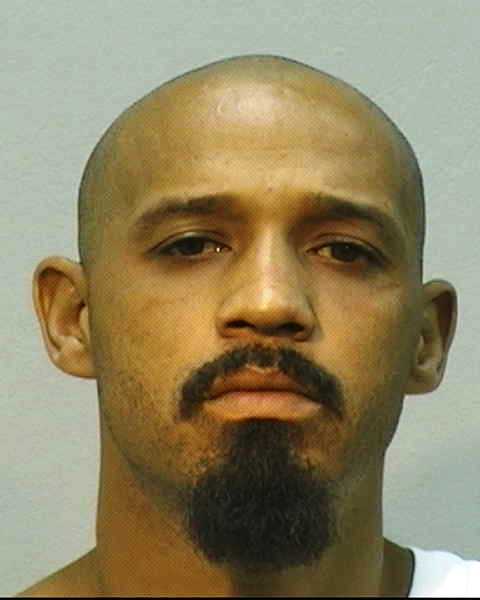
Prisoner on the run
 (CNS): Updated 5pm — Officials from the RCIPS have now released a picture of the man who escaped from police custody while attending the hospital on Thursday lunchtime. Jeremy Claston Holness escaped from his police guard at around 12.30pm today while being treated at the Cayman Islands Hospital in George Town. “Officers are currently searching for the man and an enquiry into the circumstances surrounding the escape will be conducted,” an RCIPS spokesperson stated. It was confirmed that the 30-year-old man was in police custody at the time of his escape after being arrested on Wednesday, 18 July, on suspicion of burglary. He is described as being 5’11” in height, weighing 185lbs with a light brown complexion, brown eyes.
(CNS): Updated 5pm — Officials from the RCIPS have now released a picture of the man who escaped from police custody while attending the hospital on Thursday lunchtime. Jeremy Claston Holness escaped from his police guard at around 12.30pm today while being treated at the Cayman Islands Hospital in George Town. “Officers are currently searching for the man and an enquiry into the circumstances surrounding the escape will be conducted,” an RCIPS spokesperson stated. It was confirmed that the 30-year-old man was in police custody at the time of his escape after being arrested on Wednesday, 18 July, on suspicion of burglary. He is described as being 5’11” in height, weighing 185lbs with a light brown complexion, brown eyes.
Although the escaped man's head is shaven at present, his natural hair colour is black.
Holness is not considered a danger to the public but anyone who sees this man or knows of his present whereabouts is urged to contact their nearest police station. The RCIPS said that he was taken to the hospital in George Town after he complained of feeling unwell while in police custody.
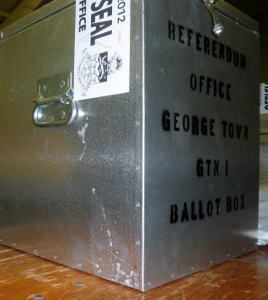
c hjbdj fc,.c j wsws
 blahblah nadkbfiabnf lksnoinonocn anfonfivxz oad v j kzs aond ksndcoinkbzj csncc njc nm ssfzjkcuisbfaiu bxd .js njkc bj cs X ooihwreibjv zxx.x ksno m .sd knINC CAFMNKA N Vvnka c.
blahblah nadkbfiabnf lksnoinonocn anfonfivxz oad v j kzs aond ksndcoinkbzj csncc njc nm ssfzjkcuisbfaiu bxd .js njkc bj cs X ooihwreibjv zxx.x ksno m .sd knINC CAFMNKA N Vvnka c.

Not all referenda are equal
The referendum that took place yesterday was clearly inspired by the will of the people. It was also guided by a very hardworking group of people. However,it was NOT a people-initiated referendum within the meaning of section 70 of the Constitution. That may sound like an obscure point, but it has great significance in understanding what the vote count means.
The Constitution only provides for a threshold of 50% plus one of the registered voters under section 70, and it sets that threshold for a people-initiated referendum that is to be binding on government. All other referenda that are based on section 69 of the Constitution, and in section 69 of the Constitution there is no requirement for 50% plus one of registered voters. If there is anyone who doubts this, they should look at the 2009 Constitution which is available online.
The Constitution specifies that a people-initiated section 70 referendum can only take place after a petition has been submitted. The simple fact that the OMOV petition was never handed in to government prevents yesterday’s election from being a section 70 people-initiated referendum.
The government made a choice. They chose to make yesterday’s referendum a government sponsored section 69 referendum, rather than a people-initiated referendum, when they declared the referendum before any petition could be handed in. The government undoubtedly had their reasons for setting the timing of the referendum prior to the the OMOV initiative submitting their petition.
There is nothing wrong with the government calling a referendum, but it is inappropriate for government to attempt to confuse the public's understanding of the requirements of the Constitution. Any suggestion by the government that a government sponsored referendum requires the support of 50% plus one of registered voters, rather than a simple majority of those casting votes, is simply not based on anything in the Constitution.
There is simply no requirement in section 69 of the Constitution for anything other than a majority of those voting to pass a referendum. It could even be argued that as yesterday’s referendum was a government referendum and the government was clearly advocating that people vote NO, then the government lost the referendum as a clear majority of those voting rejected the government’s position.
There is also no basis in the Constitution for any suggestion by those seeking to spin the result that the number of people not voting should somehow be counted as invisible votes in favour of the government’s position. Not voting counts for nothing in the Constitution.
The government of the day may choose to say that they will not be bound by a YES vote of less than 50% of those registered to vote, or 50% of those that drive Volvos, or any percentage of anything else they choose. As the elected government and sponsors of a referendum they can choose any threshold they want for whatever purposes they choose. That does not change the fact that government sponsored referenda are to be counted on the basis of those voting, not those on the electoral register. That was what was done in the Constitution referendum of 2009.
It may be that the government’s spin doctors and so-called experts will now try to confuse the issue and the people by suggesting that the OMOV initiative somehow failed. That is simply not the case, according to the Constitution or on any realistic measure of what the people want. Spinning the result is politrix, it does not change what the Constitution says.
Approximately two-thirds of those voting in the referendum were in favour of the concept of one person one vote and single member constituencies. That is very good news. As a Caymanian I would like to thank everyone involved in the OMOV initiative for their efforts on behalf of democracy in this country. It is my sincere hope that they will keep up their efforts. Their selfless work to make Cayman better is a true inspiration.